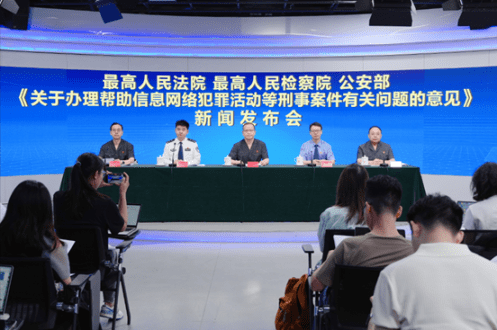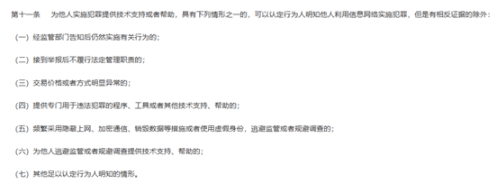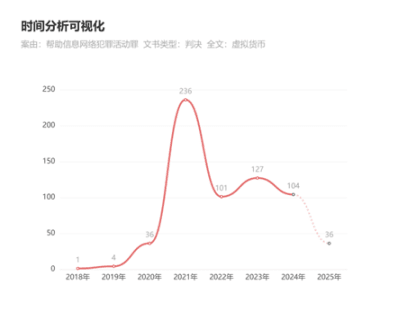On July 28, 2025, the Supreme People's Court, the Supreme People's Procuratorate, and the Ministry of Public Security (hereinafter referred to as "the two highs and one ministry") held a joint press conference to release the (Opinions on Handling Criminal Cases Related to Assisting Information Network Crimes, etc.) (hereinafter referred to as "(Opinions)"). It provided more detailed regulations on the elements constituting the crime of assisting information network crimes, as well as leniency and mitigating circumstances.

Among them, one clause will significantly impact the cryptocurrency circle, especially the groups involved in buying and selling virtual currencies (e.g., U merchants).
(What does the Opinions discuss?)
Background of the release of the (Opinions)
Network crimes represented by telecom fraud have begun to continuously develop in depth, with black and gray industries such as 'scoring platforms' around telecom fraud, online gambling, and pyramid schemes growing.
In fact, prior to this, judicial authorities including 'the two highs and one ministry' had separately or jointly released:
(Opinions on Handling Criminal Cases Related to Telecom Network Fraud, etc.) (Two Highs and One Ministry, Fa Fa [2016] No. 32);
(Opinions on Handling Criminal Cases Related to Telecom Network Fraud, etc. (II)) (Two Highs and One Ministry, Fa Fa [2021] No. 22);
(Opinions of the Supreme People's Court, the Supreme People's Procuratorate, and the Ministry of Public Security on the Application of Criminal Procedure in Handling Cases of Information Network Crimes) (Two Highs and One Ministry, Fa Fa [2022] No. 23);
(Opinions on Handling Criminal Cases Related to Cross-Border Telecom Network Fraud, etc.) (Two Highs and One Ministry, June 26, 2024)
(Interpretation of the Supreme People's Court on Several Issues Regarding the Application of Law in Criminal Cases Involving Concealment and Hiding Criminal Proceeds) (Supreme Court, Fa Shi [2021] No. 8);
(Interpretation on Several Issues Regarding the Application of Law in Handling Criminal Cases Related to Illegal Use of Information Networks and Assisting Information Network Crimes) (Supreme Court, Supreme Procuratorate, Fa Shi [2019] No. 15)
These regulations specify the composition of crimes involving telecom fraud (fraud), the crime of assisting (assisting information network crimes), and the crime of concealing (concealment of criminal proceeds), especially regarding the presumption rules of the actor's 'subjective knowledge' in the crimes of assisting and concealing.
However, the complexity of social activities is certainly not something that can be covered by one or a few judicial interpretations or criminal policy documents. For example, the emergence of virtual currencies has made traditional money laundering methods (such as underground banks) increasingly ineffective. Due to the inherent lag in judicial activities, it is challenging for laws and regulations to promptly regulate illegal activities related to virtual currencies.
Even though judicial interpretations and other regulations are relatively flexible, facing the demands of humility in criminal justice and the principle of legality, one should not rashly carry out criminal prosecutions against certain behaviors. Taking the aforementioned (Interpretation on Several Issues Regarding the Application of Law in Handling Criminal Cases Related to Illegal Use of Information Networks and Assisting Information Network Crimes) (hereinafter referred to as 'Interpretation') as an example, it stipulates in Article 12 that under the premise of 'knowing that others are using information networks to commit crimes and providing assistance for their crimes', engaging in any of the following behaviors constitutes the crime of assisting: '1. Providing assistance to three or more parties; 2. Payment settlement amount exceeding 200,000 yuan; 3. Providing funds exceeding 50,000 yuan through advertising, etc.; 7. Other severely serious circumstances.'
What are the other serious circumstances? Is there a relatively uniform judgment standard in practice? In addition, there is also a catch-all clause in the aforementioned eleventh article of the (Interpretation) stating 'other circumstances sufficient to determine that the actor knows', what is the standard for this 'other sufficient'? Practices vary.
Thus, the (Opinions) have finally been released, providing more precise guidance on the application of the crime of assisting in recent years.
(Specific content of the Opinions)
The (Opinions) consists of five parts, with 16 items. We will only discuss the core sections:
Firstly, it clarifies the catch-all clause of the eleventh article of the (Interpretation) regarding 'other circumstances sufficient to determine that the actor knows'.
1. Illegally providing SIM cards for bulk insertion into devices, illegally providing devices or software that can change caller ID, virtual dialing, or illegally access public telecom networks via internet telephony, and illegally providing bulk accounts, automatic network address switching systems, and platforms that bulk receive SMS verification or voice verification;
2. Continuing to engage in related behaviors after being restricted or suspended from services by financial institutions, telecom operators, and internet service providers due to fraud-related or other abnormal circumstances;
3. Preparing in advance the narrative for responding to investigations.
Secondly, it clarifies the catch-all clause for other severely serious circumstances outlined in the first paragraph of Article 12 of the (Interpretation), which Lawyer Liu (web3_lawyer) will not elaborate on.
Thirdly, it clarifies the criminal policy of 'leniency and severity'. For example, those who organize, use minors, students, the elderly, and other groups to commit crimes (the crime of assisting) should be severely punished; however, those who are deceived into committing crimes (also referring to the crime of assisting), those who participate for a short time or gain little profit, and minors or students involved in the case can be dealt with leniently, etc.
(How do the Opinions affect the cryptocurrency circle)
As an author who often 'self-promotes' as a Web3 lawyer in articles and videos (and has indeed handled many cases in the cryptocurrency field in reality), Lawyer Liu will certainly analyze the impact of the release of the (Opinions) on the cryptocurrency circle.
Firstly, from a general perspective, the (Opinions) will not have a very obvious and strong impact on the low-key and shrinking domestic cryptocurrency circle;
Secondly, from a detailed perspective, the (Interpretation) has already identified the behaviors in the following image as standards for presuming that the parties 'know' that others are committing crimes using information networks.

In fact, the content of the screenshots already covers many 'seemingly routine, yet actually high-risk' actions in the cryptocurrency circle: for instance, trading at significantly lower or higher prices than the market during the buying and selling of virtual currencies; as well as using encrypted communication software such as Telegram and Bat. These actions can be deemed abnormal by judicial authorities, although I feel that such regulations may not be reasonable, they are the standards applied in practice.
Finally, from a micro perspective, the (Opinions) set the standard for presuming the subjective knowledge of the actor for the following behaviors:
Continuing to engage in related activities after being restricted or suspended from services by financial institutions, telecom operators, and internet service providers due to fraud-related or other abnormal circumstances further tightens the noose on the increasingly shrinking domestic cryptocurrency circle.
If you are involved in a 'fraud-related' factor due to trading virtual currencies (for example, receiving fraudulent funds when withdrawing), and your bank, telecom company, WeChat, Alipay, and other online platforms (excluding overseas virtual currency exchanges) freeze (stop payment) your bank card, restrict calls or SMS functions, or block your WeChat or Alipay accounts; and then you continue to trade virtual currencies, and unfortunately encounter another 'fraud-related' factor, then, I’m sorry, you may be suspected of the crime of assisting.
To give another straightforward example: If Zhang San receives illicit funds for buying and selling virtual currencies and his bank card (or WeChat, Alipay) is frozen, and he continues to buy and sell virtual currencies and receives dirty money, then under Chinese criminal law, it can be presumed that Zhang San 'knows' that others are using information networks to commit crimes and (intentionally) provide assistance.
Advice for practitioners in the cryptocurrency field
On the alphalawyer platform, the author searched using 'assisting information network crime' as the case reason and 'virtual currency' as the keyword, and found that the number of judgment documents for the crime of assisting and its development trends over the past five years are generally as shown in the following image.

However, it should be noted that since 2021, the number of judgment documents published online by courts at all levels across the country has significantly decreased, so the above image cannot fully objectively display the true information regarding cases of assisting in virtual currency crimes. My personal judgment is that the numbers from 2021 to now have been continuously increasing or at least relatively stable.
For practitioners in the cryptocurrency field, it can be anticipated that the future of China's domestic cryptocurrency ecology will only become more closed and difficult; in practice, the author suggests that everyone can legally hold their own virtual currencies, but when attempting to cash out, one must be very cautious. If one mistakenly receives illicit funds, especially fraudulently obtained funds, it would be best to completely avoid cashing out domestically in the future.
